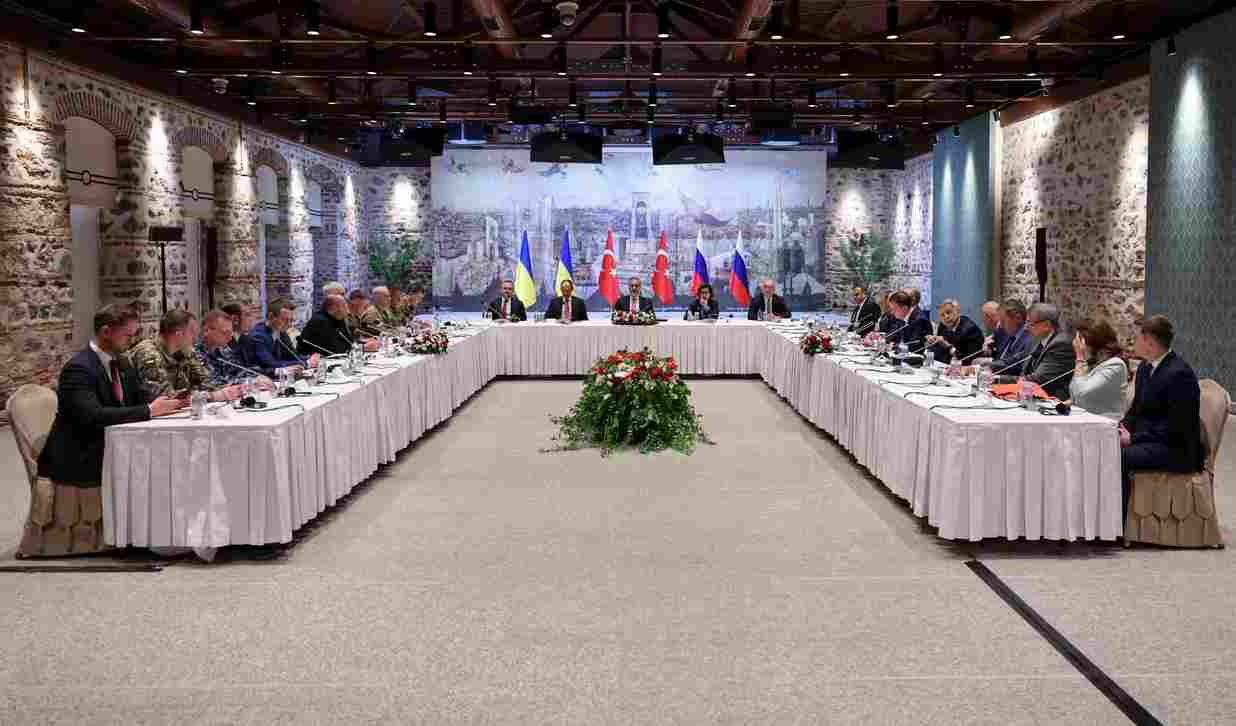
In addition to agreeing to exchange 1,000 prisoners each, Moscow maintains maximalist requirements in Istanbul
Russia and Ukraine agreed with a large -scale prisoners’ exchange, but failed to reach an agreement during their first direct peace negotiations since 2022, held in Istanbul without Vladimir Putin or Volodymyr Zelensky.
Under pressure from US President Donald Trump, Ukraine pressed by a 30-day ceasefire before negotiations. Moscow rejected the proposal, apparently remaining true to his maximalist demands, including restrictions comprehensive to Ukrainian sovereignty.
The images of the meeting, held at Dolmabahce Palace, were shocking: a row of Russian delegates in dark suits sitting in front of Ukrainians wearing their characteristic uniforms of green camouflage.
The only tangible result of the negotiations, which lasted less than two hours, was that both sides agreed to exchange 1,000 prisoners of war, the largest prisoners’ exchange of the conflict.
Although the meeting seems to have little effect at the end of the conflict, it represents a symbolic victory for Putin, who refused to accept the 30-day ceasefire that Ukraine and its European allies demanded as a prerequisite for negotiations.
The Russian leader has been involved in a delicate act of equilibrium with the US President, seeming to support peace negotiations to maintain Trump’s favor, while pressuring that we in practice are equivalent to Ukraine capitulation.
The result will probably be seen as a setback for Zelenskyy, after his bold bet to challenge Putin to a direct encounter in the hope of winning Washington’s favor and exposing what Ukraine describes as empty promises of the Russian leader to end the war.
Vladimir Medinsky, the ultra -conservative chief of the Russian delegation, said Moscow was pleased with the results and prepared to continue talking to Kiev.
Both sides said they discussed the organization of a meeting between Zelensky and Putin, who met only once in 2019.
The impasse seems to pave the way for a summit between US and Russia, after Trump undermined the negotiations on Thursday, stating that “nothing will happen” until he meets Putin personally. On Friday, the increasingly impatient American president with the slow pace of negotiations, said he would meet his Russian homologist “as soon as we could make an appointment,” generating fears in Kiev that they can be left out while others decide their destination.
Zelensky has spent the past few weeks meeting various US demands to demonstrate his willingness to seek peace. But Trump’s latest statements-which frame a US-Russian summit as the only way to resolve the conflict-stressed their inability to influence the US President’s thinking.
Expectations for negotiations were already low, with US officials minimizing hopes and Moscow showing little willingness to reach an agreement.
Russia remained true to its maximalist territorial demands, insisting that Ukraine delivers areas that Moscow does not even control, according to a source of the Ukrainian delegation quoted by Reuters on anonymous condition.
The Western Allies of Ukraine, along with Zelensky, were quick to denounce Russia’s position. Keir Strmer, who was in Albania for a European summit, said the United Kingdom, France, Germany and Poland agreed that the Russian position in peace negotiations was “unacceptable” and discussed the issue with Trump. A photograph showed the country’s leaders, along with Zelensky, speaking by phone with Trump after failed negotiations.
European leaders are wrong with Donald Trump by telephone in Tirana, to be a skeleton for the right: | Kugler/Bundessage/Reuters
Stmerer said: “We just reunited with President Zelensky and then had a call with President Trump to discuss the developments of today’s negotiations. And the Russian position is clearly unacceptable, and not the first time. So as a result of this meeting with President Zelensky and this connection with President Trump, we are now aligning our answers and we will continue to do so.”
Zelenskyy renewed his calls for sanctions to Moscow if the country does not agree with a ceasefire. “Our position is that if the Russians reject a total and unconditional ceasefire and the end of the murders, severe sanctions must be imposed,” Zelenskyy said in the X. “The pressure on Russia should be kept until Russia is ready to end the war.”
Kiev hopes and among his European allies that Trump would impose harsh sanctions after failed negotiations were frustrated by the US President indicating that he wanted to meet Putin, leaving Moscow with little encouragement to reach an agreement in Turkey.
The meeting began 24 hours after the plan, after a frantic day of confusion and political theater.
Putin, who had proposed the meeting, chose not to travel to Türkiye. Instead, he sent a mid -level delegation, which led Zelensky to question Moscow’s seriousness, discarding Russian representatives as mere “theater props.”
Zelensky, who arrived in Ankara on Thursday, eventually gave in to US pressure to continue negotiations and agreed to send a delegation to Istanbul led by Ukraine Defense Minister Rustem Umarov.
“Unfortunately, [os russos] They are not taking negotiations seriously enough… out of respect for the president [Donald] Trump e [ao líder turco, Recep Tayyip] Erdoğan, I decided to send our delegation to Istanbul now, ”said Zelenskyy.
Behind this reckless stance there is a fundamental and, for now, irreconcilable division in the approaches of Zelensky and Putin to peace.
Ukraine has consistently required a total ceasefire of 30 days before starting substantive negotiations. He indicated that he may be willing to accept the freezing of the front lines and give up his attempt to join NATO, but only in exchange for greater western military and economic support, as well as safety guarantees that may include European troops on land.
Zelensky reiterated on Friday that his number one priority was “a total, unconditional and honest ceasefire. This should happen immediately to interrupt the killing and create a solid basis for diplomacy.”
Moscow has consistently rejected extended ceasefire proposals, arguing that they would give Ukraine time to rear and regroup at a time of advances on the battlefield by Russian forces.
Instead, Kremlin tried to frame Friday’s meeting as a continuation of unsuccessful negotiations held in March 2022. At the time, Russia’s demands included the drastic reduction of Ukraine Armed Forces, the impediment of reconstruction with western support and the imposition of other comprehensive restrictions on Ukrainian sovereignty. Kiev repeatedly rejected these terms.
Medinsky, who led the Russian delegation in Türkiye, is a Kremlin advisor and former Minister of Culture who repeatedly questioned Ukraine’s right to exist as an independent nation. During the meeting, the self -proclaimed historian, often criticized by historical revisionism, would have invoked the 21 -year war of Szar Pedro I against Sweden as a warning to Ukraine, suggesting that Moscow would survive a prolonged conflict and install Kiev to accept the terms of Russia.
Originally published by The Guardian on 16/05/2025
By Pjotr Sauer in Istanbul
Ruth Michaelson in Istanbul contributed to this report
Source: https://www.ocafezinho.com/2025/05/16/russia-e-ucrania-concordam-em-troca-de-prisioneiros-mas-negociacoes-de-paz-nao-avancam/

